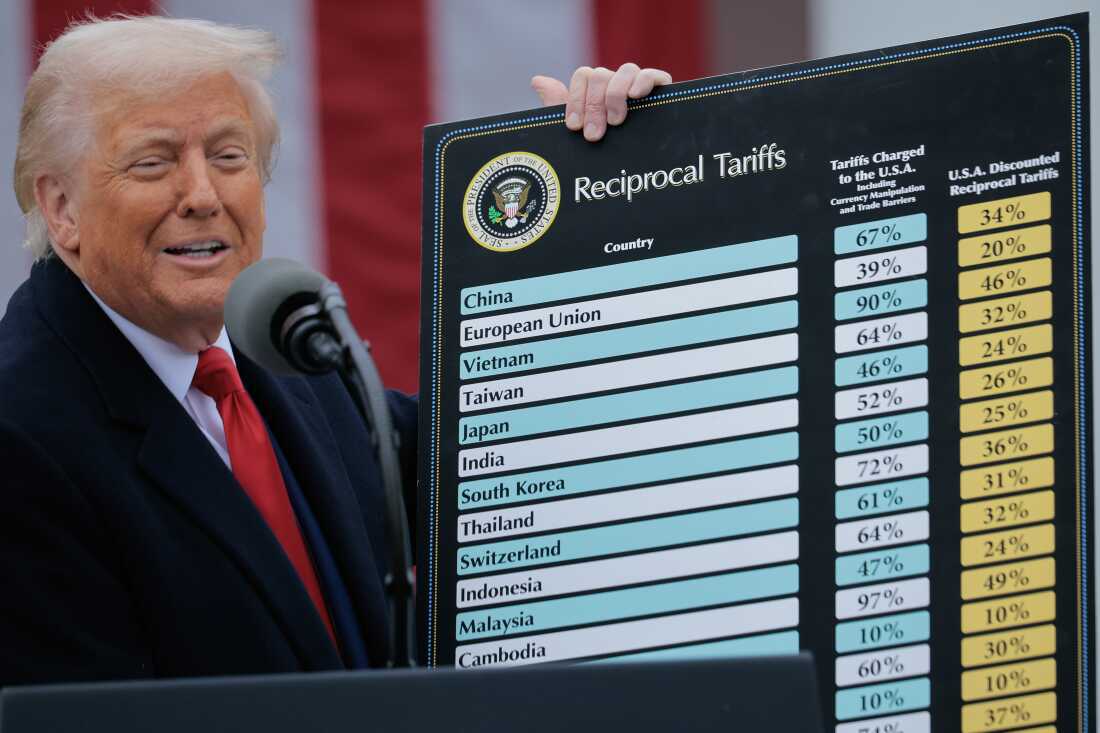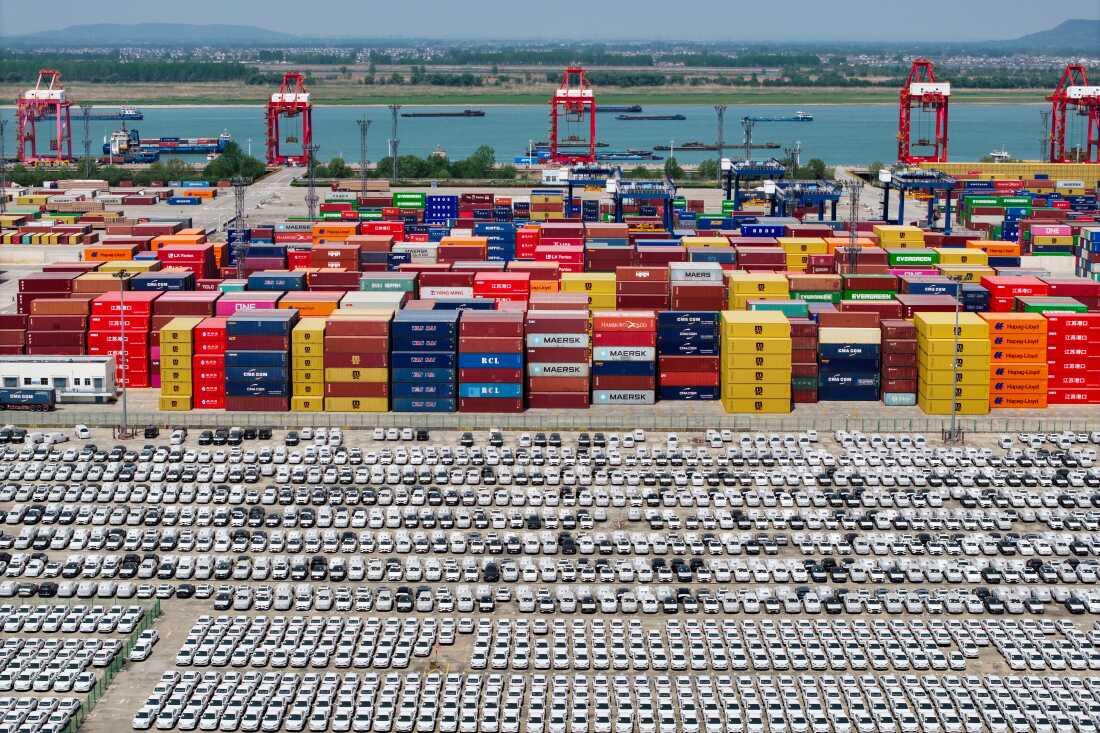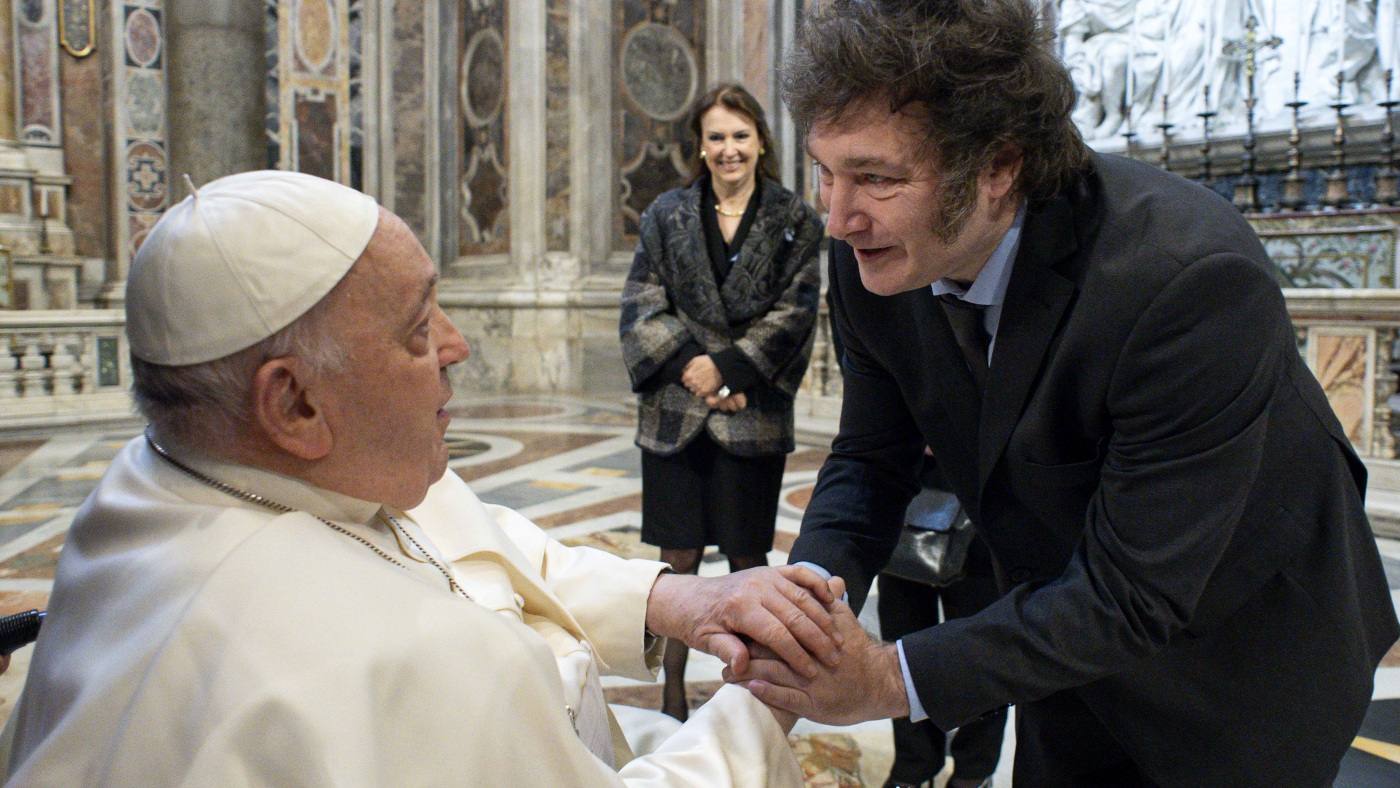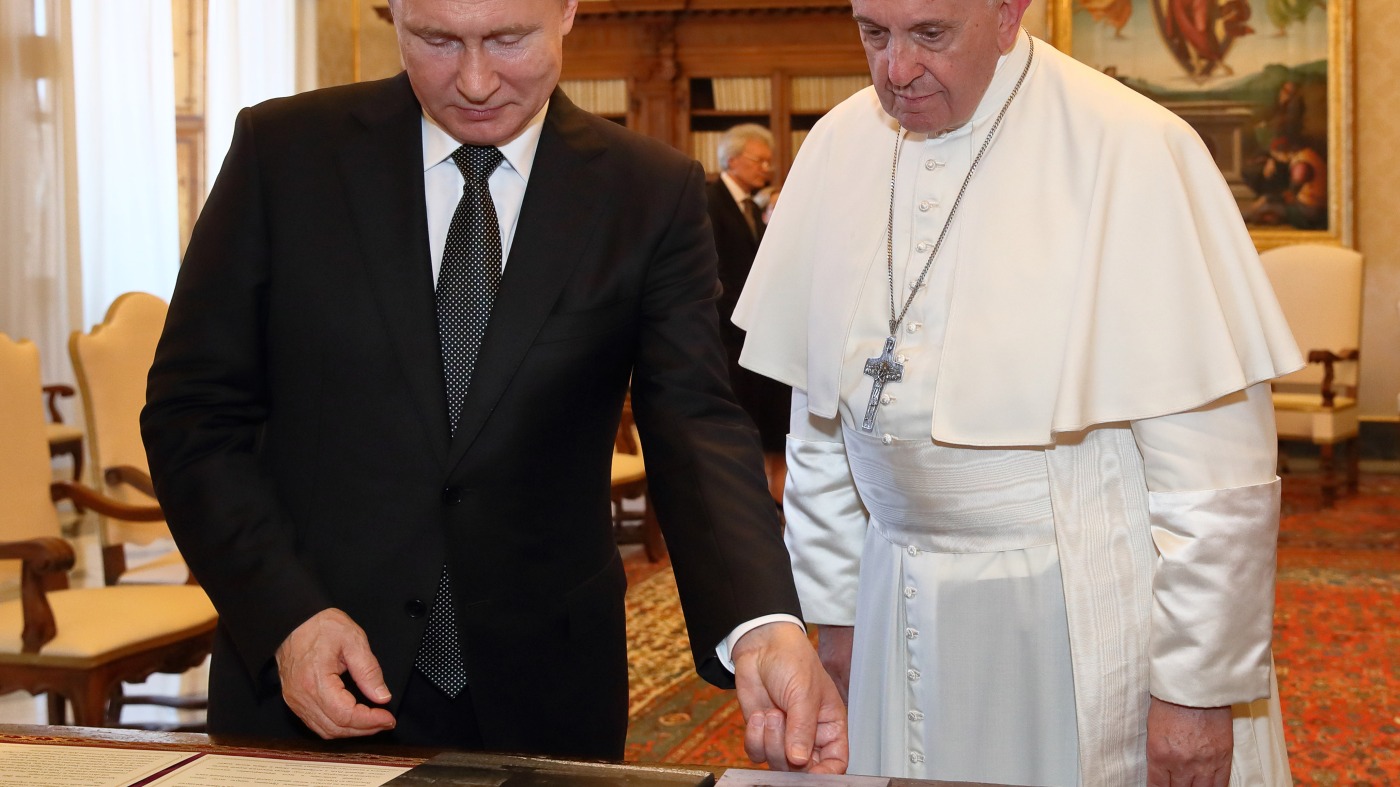
Something rare is happening on Wall Street: Stocks, bonds and the dollar are all falling at the same time — and investors are debating why. Charly Triballeau/AFP via Getty Images hide caption
toggle caption
Charly Triballeau/AFP via Getty Images
For decades, the U.S. financial system has been regarded as one of the most stable and powerful in the world. Now, there are fears that something unprecedented may be happening as a result of President Trump's tariffs: Investors everywhere may be losing their faith in the United States.
The concerns come as Wall Street is being convulsed by an extremely rare event: Stocks, U.S. government bonds, and the dollar are all taking a hit at the same time — and not everybody can agree on why.
The most pessimistic fear is that the sell-offs mean that investors around the world are losing trust in the U.S. as a result of Trump's unpredictable policies — and they are therefore cutting their investments across the board.
If true, it would represent a seismic change in the global financial system, in which the U.S. is no longer considered as a haven.
And it matters in the U.S. as well. Foreign investors' confidence in the United States is critical — not only to the trillions of dollars tied up in this country's financial markets, but to the American way of life.
Here are five key questions about the financial storm that President Trump may have unleashed.
What is happening in the markets?
As soon as Trump unveiled his tariffs on April 2, stock markets plummeted all over the world. That was not a surprise. Stocks tend to immediately react to big news — good and bad. The Dow Jones Industrial Average has recovered somewhat after Trump paused many of his tariffs, but it's still down more than 7% since his initial announcement.
But typically, at times of intense turmoil, investors rush to buy U.S. government bonds and the dollar. And for good reason.
U.S. Treasury bond, or just Treasuries as they are usually known, are widely considered among the safest holdings in the world, sold — and backed — by the economic might of Uncle Sam. And the dollar is the world's biggest currency, used everywhere from buying gas at your local station to paying for business transactions around the globe.
A simultaneous fall in all markets — from a country's stocks to its currency — happens occasionally in emerging economies, such as when the Asian financial crisis swept the region in the late 1990s.
It has rarely happened in the U.S., according to many who follow the market.
So why are stocks, bonds and the dollar all falling at the same time?
That's what even the smartest minds on Wall Street are debating.
One explanation is that it has to do with sophisticated investors, both foreign and domestic, adjusting their portfolios based on tariff news that stunned most people in financial markets.
After all, many investors had believed Trump was just using tariffs as negotiating ploy. Instead, his tariffs are so sweeping they threaten to kickstart a new global economic order. Some analysts compare it to when President Nixon delinked the U.S. dollar from gold, in what became known as the "Nixon Shock."
But there's another explanation for why all three markets fell: What if the sell-off represented the moment the U.S. lost the trust of global investors — and now means that U.S. bonds and the dollar are no longer considered to be among the world's safest investments?
After all, in less than 100 days, Trump has also unsettled investors with chaotic firings across the federal workforce, pushed to acquire Greenland, expressed a desire to "take back" the Panama Canal, and said Canada should become the 51st state, among many other actions.
Taken all together, it's creating what markets hate most: Unpredictability. — and Wall Street fears it's making foreign investors lose confidence in the U.S. as a result.

President Trump unveils his sweeping tariffs during an event at the White House on April 2, 2025 in Washington, D.C. Chip Somodevilla/Getty Images/Getty Images North America hide caption
toggle caption
Chip Somodevilla/Getty Images/Getty Images North America
Why are foreign investors so critical?
For decades, foreign investors — from major global central banks to mom-and-pop funds — have placed some of their cash in bonds sold by the U.S. government because they are seen as havens.
All that money helps the U.S. continue to spend money, even when the country is facing ballooning deficits. It also contributes to a stronger dollar, since foreign investors need to buy dollars so they can buy U.S. bonds.
Because there are so many investors willing to buy bonds from Uncle Sam, the U.S. doesn't have to pay out high interest rates. It's effectively like having a low-interest credit card: It gives the country more confidence to spend money, because it can afford to finance its purchases.
According to the latest U.S. tally, foreign investors owned well over $8 trillion worth of debt issued by the federal government.
What happens if foreign investors stop buying?
The effects on the U.S. finances could be dire.
Back to the credit card analogy: Say you have long relied on a low-interest credit card to pay your bills. But suddenly that credit card company decides you are too financially risky and stops lending you money unless you are willing to pay much higher interest rates. That may not bankrupt you, but financially, it would be very painful.
That's what happens when foreign bond buyers get hesitant: It drives up the interest rates the U.S. must pay to entice them to buy — and makes borrowing much more expensive, making it harder to finance the country's spending.

Chinese made cars, including Volvo and other brands, are seen at the port in Nanjing, in China's eastern Jiangsu province on April 16, 2025, as they wait to be loaded onto ships for export. STR/AFP via Getty Images/AFP hide caption
toggle caption
STR/AFP via Getty Images/AFP
An even bigger fear is that foreign investors could deliberately decide to stop buying U.S. bonds as a way to hurt the nation financially. And there's no country that investors worry about more than China.
Despite the longstanding tensions between the U.S. and China, one thing has held steady: China has continued buying U.S. government bonds. It now owns over $750 billion worth, according to the latest government tally, making it the second biggest foreign holder of Treasuries after Japan.
It's a mutually beneficial relationship. It allows the U.S. to continue spending money and it provides China with an ultra-safe investment.
Were China to stop buying so many U.S. bonds — or worse, start selling their portfolio — the impact could be massive. It would unleash financial turmoil across markets by suddenly raising concerns that the world's two biggest economies could be embarking in a mutually destructive financial war.
So why is there no agreement about what's actually happening?
On average, hundreds of billions of dollars' worth of trades take place every day in U.S. bond markets. It's impossible to know who's behind every single trade in real time.
Wall Street experts often rely on lagging government statistics, as well as data from private providers, to try to figure out who are the big buyers and sellers of government bonds. But even that data is subject to interpretation.
In recent days, Treasury Secretary Scott Bessent has rejected the notion that foreign investors are selling U.S. bonds. He has also said he doesn't believe China is intending to hit back at the U.S. by selling off its bonds.
Nonetheless the speculation and the uncertainty continue — and that's unlikely to change anytime soon.
"I think that it'll take time for markets to go back to normal," said Kevin Ford, an analyst at global commercial payments firm Convera. "There's so many questions and there's really no playbook for it."
But there's one thing that many analysts agree on: Even if the world's investors are not rushing to the exits, confidence in the U.S. has taken a big hit.
"It takes us a long time to build up trust with friends, with wives, with lovers, and yet it could be lost in a second," says Marc Chandler, Chief Market Strategist at Bannockburn Capital Markets. "And I think that trust is going to be hard for the U.S. to regain."

 6 hours ago
2
6 hours ago
2

















































